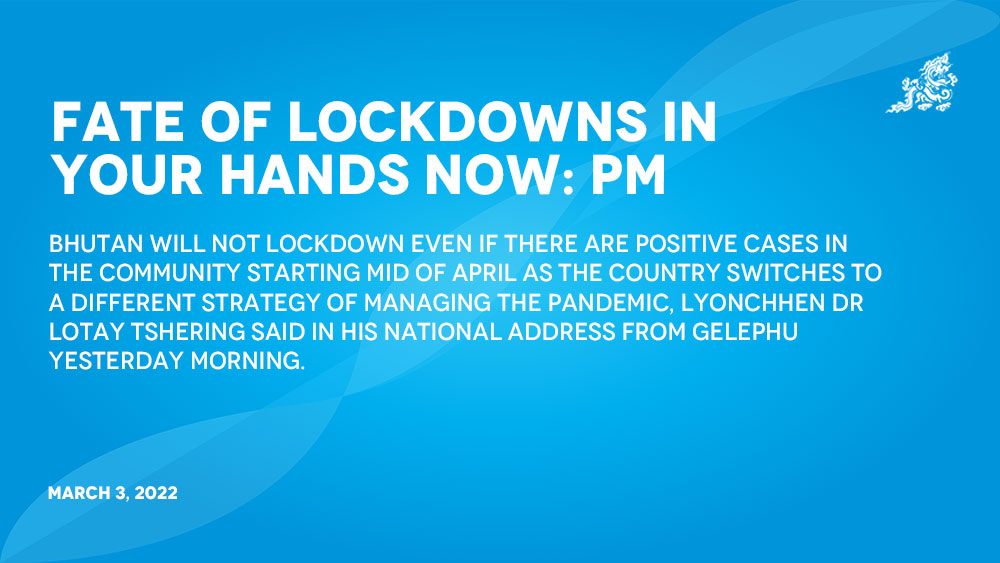Nima Wangdi
Bhutan will not lockdown even if there are positive cases in the community starting mid of April as the country switches to a different strategy of managing the pandemic, Lyonchhen Dr Lotay Tshering said in his national address from Gelephu yesterday morning.
Lyonchhen said this would be implemented after the ongoing classes X and XII board exams and vaccination of children between the ages 5-11. “All these will be complete by mid-April. Until then we don’t want to risk anything.”
Future lockdowns will be enforced under two circumstances: when the country reaches the threshold of bed occupancy at the Covid-19 isolation ward or if there were the emergence of lethal variant. “We hope lockdowns would not be required at all.”
“This is an all-new level Covid-19 response strategy. It changes the way we manage the disease like the quarantine, trace, test and treat, among others,” Lyonchhen said, as His Majesty has commanded these changes and still adhering to the objective of not losing lives to Covid-19.
Lyonchhen said that eliminating the virus from the communities would not be possible but its spread can be controlled. “If the hospitals are filled, then the only solution will be to lockdown.”
In a briefing with the media, he said, if there were lockdowns at all it would be like a ‘military curfew-like’ to stop the transmission chain. “The shortest duration will be for two weeks but that would be the last resort. We should not let it happen.”
Gearing up to the new strategy, the health ministry has changed its daily update on total new Covid-19 cases. Lyonchhen said that the government would update on the number of people coming to the hospital, how many are critical and the number of vacant beds. “When the vacant beds in the hospitals cross the critical level, then people should realise it as an indication of worsening situation and prepare for a lockdown.”
Overrunning health infrastructures will be dangerous
Lyonchhen said, like in other countries, there are dangers of seeing more Covid-related deaths if the health infrastructures come under so much pressure.
He said that the country still doesn’t have adequate health facilities or workforce, not even near adequate. The country today has three major hospitals and a few general hospitals like Phuentsholing, Samtse and hospitals in Dewathang and Bajo. The rest are general hospitals only manned by general doctors, who are fresh graduate doctors. “That’s why, going forward, we have to be very cautious and each of us has to be responsible.”
Lyonchhen said most of the Covid deaths are preventable in fact but if the health infrastructure is overrun, it would not be possible. “If the carrying capacity of the hospital is 100 and if we operate at 70, we should be able to prevent all preventable deaths.”
Even in other countries, more than 50 percent of the Covid deaths could have been prevented should their health infrastructures were not overburdened. “When the body is fighting the disease, we should give supportive care like good nutrition, good hydration and oxygenation,” Lyonchhen said.
This scenario could easily come to Bhutan if not cautious.
He said, “We should control the number of people being hospitalised from Covid-19 and for which it was imperative to reduce the number of infections.”
Travel restrictions
Lyonchhen said once the children were vaccinated, the quarantine period for those moving from high risk to low risk may be reduced to three or five days from the existing one week. “We will also relook into the international travellers who are required to be quarantined for 14 and 21 days as of now.”
“This is because to have zero Covid in the community has now changed. We will take the longest incubation period.” He said he doesn’t see the possibility of three weeks quarantine and it could come down to a week or so going by the global trend.
He said there would be changes in the system phase-wise from here on, after the board exams and children aged 5-11 are vaccinated.
Citizen’s responsibility
So far, the government placed measures to prevent Covid-19 transmission in the community. Lockdowns were enforced whenever there were outbreaks and community cases.
To ensure there are no outbreaks in the community and to reduce hospitalisation, Lyonchhen said that the citizens have to know what each of them should be doing when they go out.
He said those going out shopping should be doing much more than wearing face masks and avoiding crowds including avoiding transactions of physical money.
“I am not imposing any new responsibility on the citizens but reminding them how responsible one should be,” Lyonchhen said.
He said the lockdown was doing a lot of collateral damage but the risk of the virus was high and could not avoid it. “Now the risk has come down. We will have virus in the community but we’ll make sure we don’t have deaths.”
In the coming days, respective authorities would be fine-tuning the protocols and the strategy that have been carefully drawn out from observing how strategies have worked in other developed countries and the science surrounding Covid-19 in the past few weeks.
The current restrictions in Thimphu will continue until the board examinations are over and there will be separate announcements.


